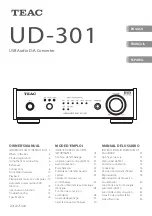
MC500
RollCall Control Panel Channel Operation Screens
Issue 1 Rev 6
Page 139
© 2015 SAM
11.9.2.2
On Timecode Loss
On Timecode Loss defines how the embedded output timecode should behave if input
timecode cannot be detected.
•
Freeze:
On timecode loss, the output timecode will freeze at the last valid detected
input value, until the valid input returns.
•
Free Run:
On timecode loss, the output timecode will switch to free-run and generate
its own timecode starting from the last valid detected input value, until the valid input
returns.
11.9.2.3
Trigger Config
When Input Trigger mode is selected, the Trigger Config controls enable you to enter an input
timecode value that will trigger the free-running output timecode, and a starting timecode
value for the free-running output timecode.
•
Input Trigger Entry:
In this field you can enter a value to specify when the output
timecode starts. Once set, the output timecode will start when the video source input
timecode reaches the trigger value set in the Input Trigger Entry field. To enter a
value:
In the Input Trigger Entry field, enter the required value and click S to set. To return to
the preset value, click P.
•
Output Timecode Entry:
In this field you can enter a value to specify when the
output timecode starts. Once set, the output timecode will start when the input
timecode reaches the trigger value set in the Input Trigger Entry field. To set a value:
In the Output Timecode Entry field, enter the required value and click S to set. To
return to the preset value, click P.
11.9.2.4
Generator
When timecode Generate mode is selected, the controls enable you to enter a specified
starting timecode of the free-running internal timecode generator.
•
Timecode Entry:
In this field you can enter a value to specify when the internally
generated timecode starts. Once set, the internally generated timecode will start when
you select the Timecode Load button. To enter a value:
In the Timecode Entry field, enter the required value and click S to set. To return to
the preset value, click P.
•
Timecode Load:
Manually triggers the internally generated timecode, starting at the
time specified in the Timecode Entry field.
•
30FPS:
Output timecode always follows the correct count sequence for the output
standard, except when following an input timecode that does not represent actual
time (except if the input is flagged as 59 non-drop).
Drop Frame operates as follows:
•
When converting timecode from 29/59 Hz to 29/59 Hz standards, the output
drop-frame type automatically matches the input (the Drop Frame control has no
effect).
•
When using the internal timecode generator with a 29/59 Hz output standard, the
drop-frame type is determined by the Drop Frame control.
•
When converting 23 Hz inputs to anything, follow input will give a broken
sequence.
Note:
For the Input Trigger mode to work, a value is required in both the Input Trigger Entry field
and the Output Timecode Entry field.
















































